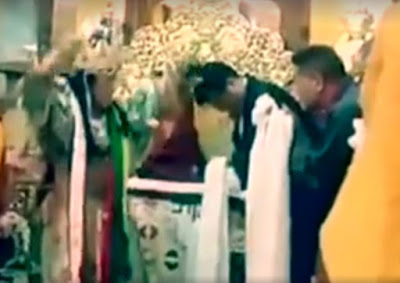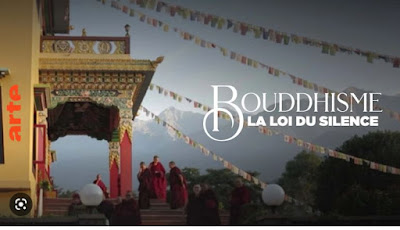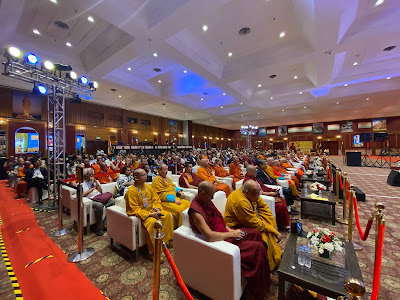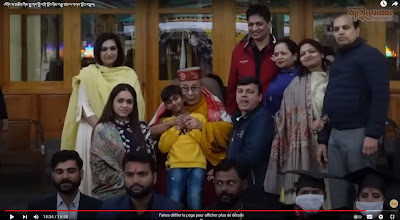The initial offensive "pedophile" viral after the Dalai-lama's “suck-my-tongue” incident was first followed by a defensive Tibetan viral of everything that the Dalai-lama stood for with an explanation of the Amdo grandfathers’ "Eat my tongue" custom... Then came the various declarations by groups of Tibetologists/academics or individual academics in the anthropological field about the importance of cultural context, and finally by children’s rights or abuse survivor instances.
According to the Dalaï-lama’s biography on his website (www.dalailama.com), he is simultaneously “a simple Buddhist monk” and “the spiritual leader of Tibet”. Until march 2011, the Dalai-lama was also the political leader of the Tibetan people. Since 1959 he had been both the religious and political leader of Tibetans in exile. Whatever his real power, he was certainly seen as the symbol of the Tibetan people and their resistance against the Chinese occupation. After his Nobel Prize for Peace in 1989, he has also become a global figurehead for world peace and a spokesman for compassion, religious tolerance, and gave signs of being in favour of a certainse cularisation of human ethics. Through his many declarations about universally shared human values he became a known and popular influencer in the West, for Buddhists and non-Buddhists alike.
As a media-savvy teacher, the Dalai-lama had two groups of students, Tibetan people in occupied Tibet, in exile or the Tibetan diaspora, and Western converts or sympathizers who felt inspired by his Western compatible wisdom and may have seen themselves as students from a distance of a media-savvy global Buddhist teacher. Of course, Tibetan students may also have felt inspired by the Dalaï-lama’s Western compatible wisdom, and Western students may have received blessings, vow, initiations etc. from the Dalai-lama. Both may see the Dalai-lama as a skillful teacher, capable of teaching in the most traditional and in more contemporary ways. At different times, the Dalai-lama may have disappointed (or enchanted) one category or the other, not to mention the disagreements about internal Tibetan affairs.
 |
| The Dalai-Lama as Kālacakra (from: Man of Peace) |
In spite of his withdrawal in 2011, the Dalai-lama is still a political figure, both geopolitically as well as a Buddhist (formerly theocratic) leader. In the past he liked to present himselfas a Marxist (although not as a Leninist), but none of his actual declarations, decisions or actions seem to point in that direction. On the contrary, his resistance against “communist” China made him a welcome figurehead, and an ally and friend for many overtly anticommunist and conservative politicians and religious leaders, for whom the Dalai-lama also is an ally in their common battles against “materialism”. Both politically and religiously, the Dalai-lama is a conservative.
Buddhist sanghas and institutions have always survived and lived through the patronage of kings, emperors, merchants, traders, artisans, and this is still true today, including for Tibetan Buddhism. It’s through private money, donations, awards, grants - charity and philanthropy rather than taxes - that Buddhist institutions thrive and fund their monasteries, schools, hospitals, academic endeavors, charities etc. and may even support other charities. It’s therefore also in their own interest, and for their own survival in non-Buddhist countries, that they tend to side with the rich and the powerful, and never go against the interests of their patrons. This becomes even more complex when associated with the Tibetan cause, in a world with international laws where religion and state ought to be kept separated.
How to distinguish between the Dalai-lama as an individual, a simple monk, avatar of Avalokiteśvara, a religious leader, a tantric teacher and a (inter)national guru, a political leader, the figurehead of Tibet-Tibetan people-Tibetan Buddhism as long as he lives, the “separatist” enemy of the Chinese state etc., all in one person. Is there still an “individual” behind the Dalaï-lama, of which some aspects or individual actions could be criticized as such, without automatically implying an attack on everything that this specific Dalaï-lama is thought to represent? In Tibetan Buddhism, “sacred outlook” (tib. dag snang) is imposed on the relationship between a student and his teacher, but this is in the first place a personal and individual relationship, not a collective one. Is there some sort of collective “samaya” at work in the relation between the Dalai-lama and his people (or perhaps subjects, or the shadows thereof), that goes beyond the common sense of national identity or loyalty - in this case even more painfully so of a people (and their culture) in exile? It may seem it goes further than the loyalty of subjects towards their monarch, because there always have been “good and bad”, popular and unpopular monarchs. There also have been “good and bad”, popular and unpopular popes, and popes who, although infallible, are not beyond criticism, nor are the actions and abuse of clerics within the Catholic church. Monarchs and popes were still considered individuals, replaced by other individuals. Not avatars and reincarnated saints. If faith, devotion and sacred outlook are the crux of the Tibetan Buddhist practice, then there is not much of an “individual” left to criticize in the deeds and actions of reincarnated hierarchical clerics. Any criticism then becomes an attack on the institution, and at the same time an exposure of one’s own defective practice of one’s faith, devotion and sacred outlook as a Buddhist.
Even if the current Dalai-lama wouldn't have seemed such a friendly, smiling and sympathetic person, one expects that it’s not about anything individual, and probably not even about the office of a Dalaï-lama (there could be no next Dalaï-lama…), but rather about the Tibetan people as a whole, that “stands with the Dalai-lama”. The Dalai-lama apologized for his inappropriate words “suck my tongue”. Not for the gesture. But the many interpretations that followed made the apology totally unnecessary.
A rather idiosyncratic “custom” from the Tibetan region Amdo has been put forward as the right interpretation of the Dalai-lama’s word and gesture. It would be unfair, scandalous etc. to watch the scene and interpret it otherwise than with this obscure Amdo “custom” in mind. Why didn’t the Dalai-lama and the Office of the Dalai-lama think of this custom, apparently so obvious to Tibetans and Tibetologists, or simply mention it in the apology? Those who misinterpreted the gesture would even owe an apology to the Dalai-lama… Regardless of the real possibility that the Dalai-lama indeed is wise, beyond saṃsāra (Penpa Tsering), compassionate and incapable of inflicting any harm to anyone, it seems to be more the case of the Dalaï-lama, or a Dalaï-lama, being incapable of flaws and mistakes per definition. Also added to this because he is a refugee and refugees are not allowed to make mistakes. The very thought of the possibility of the Dalai-lama making a mistake seems already like going too far, or going against the injunction of some sort of sacred outlook, combined with a deeply felt solidarity and loyalty among refugees. How can a healthy democracy exist in such a situation?
“New struggles. -- After Buddha was dead, they still showed his shadow in a cave for centuries -- a colossal, horrible shadow. God is dead, but given the way people are, there may still be caves for millennia in which his shadow is displayed. -- And we -- we must still defeat his shadow as well!”― Friedrich Nietzsche, The Gay ScienceA couple of examples, some more recent than others.
“For God’s sake His Holiness is 87 years old. He’s going to be 88. And he lived a monk’s life under oath of celibacy over the last 87 years.” [Because of his age he needs to be supported from both sides. And you want to accuse an 87-year 88-year old man with this kind of libel?]How would a democratic Justice system judge clerics reputedly redeemed from Samsara and beyond the sensorial pleasures ?
“Forget about the sensorial pleasures. He does not derive any pleasures from sensory. You always talk about deeper understanding, to redeem oneself from Samsara. So he is beyond the sensorial pleasures,” he added.” (The Daily Guardian, April 14th 2023)
 |
| Tweet by Tenam 22042023 |
On April 22th 2023, Pema Khandu, the Chief Minister (and son of the former Chief Minister) of Arnunachal Pradesh, met with the Dalaï-lama and prostrated himself in front of him. As often, the Dalai-lama seems to gesture to him not to bother, but do Buddhist members of parliament, ministers etc. do indeed have the political power to not follow the official etiquette?
When the former Sikyong, Lobsang Sangay, was still in power ( from 2011 to 2012), Samdhong Rinpoche had warned him “You can make any changes as head of the Tibetan cabinet. But if you make any error, no matter how small it is, in your efforts to promote Middle-Way, I will come to your office with a stick.” (Why I won’t vote in the Final Sikyong Election, Choenyi Woser, Phayul.com, March 1st 2016).
 |
| Screencapture (April 1st 2016, video FB Lhagotsang no longer available) |
On April 1st 2016, Lobsang Sangay et Penpa Tsering were both invited at an audience with the State Oracle of the Dalaï-lama, Nechung Choegyal and with Tsering Chenga, where they got scolded by the State Oracle who threw barley at them (Asia News, The Oracle of Tibet throws barley at politicians: Corrupt and unfair 04/05/2016).
“In the Official letter on the prophecy, the Oracle "condemns the “mishandling of the gift of democracy” besides the violation of the oaths taken by both Sikyong and the Speaker. The letter warned that the mismanagements could lead to negative consequences on His Holiness the Dalai Lama’s health and life and directed the two to offer apology to His Holiness the Dalai Lama.”
 |
| CTA President Dr Lobsang Sangay paying obeisance to state oracle Nechung” (Photo/Tenzin Jigme/CTA) |
Another article in Tibet.Net (June 12 2019), mentions the audience as an annual ceremony for the Central Tibetan Administration “to pay respect and gratitude to Nechung, a key state oracle of the Central Tibetan Administration”, and publishes pictures, amongst which “CTA President Dr Lobsang Sangay paying obeisance to state oracle Nechung” (Photo/Tenzin Jigme/CTA)
These events took/take place after the withdrawal from power of the Dalai-lama in 2011. It is understandable that a people in exile is attached to the preservation of their culture, even a theocratic one, whilst sincerely trying to establish a democratically elected local government. Democracy, freedom of speech and critical thinking were thought as universal values to be applied all over all the world, but reincarnated saints or clerics and oracles certainly don’t make it easier. Especially when these values are seen as "Western values"...
I end with the last box of a short comics published as a tweet by "Official Twitter Account of China Human Rights Website" (中国人权网)... (sic!) on April 24th 2023. A quick look at the other tweets shows that the China Human Rights Website is not really bothered by Human Rights, but mostly by posting (before April 18th) anti-American tweets, memes etc., the Dalai-lama being considered as a USA agent. But the last box shows in my own experience and opinion how the incident is likely to be viewed by “uninformed” young teenagers of different origins (probably even including “uninformed” teenagers of Tibetan origin), no matter how the 2-minute sequence is cut, cropped etc., and regardless of the Amdo custom hindsight. Something is not right here, is it possible to discuss and determine what exactly?
 |
| Detail tweet "Official Twitter Account of China Human Rights Website" |
I think the following articles are a good start
Dalai Lama Row: Consent, Body Boundaries And Respect, by Anushree Joshi (Feminism in India, April 19th 2023)
The Dalai Lama ‘Incident’: How Not To Respond To A Troubling Sexual Situation With A Child, by David Clohessy (Religion Unplugged, April 25th 2023)



























